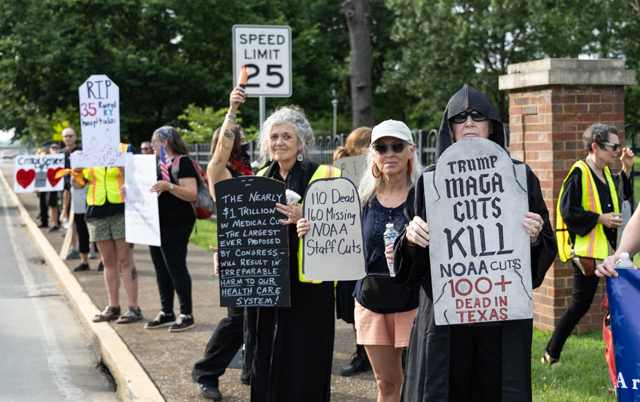Photo by Miranda Pederson
Published 12:00 am Thursday, September 2, 2004
Sarah Salisbury and her 6-year-old son,Damion, along with her husband, Dennis, andtheir three other children, are stuck in Bowling Green after running out of money in anattempt to relocate from Salt Lake City.Miranda Pederson/Daily News
Bowling Greens invisible homeless
Trending
From failed relocation efforts to eviction and domestic violence, those without can be hard to count, difficult to help
By Hayli Fellwock, hfellwock@bgdailynews.com — 270-783-3240
Thursday, September 02, 2004
Ask Barbara Erickson how she wound up in Bowling Green and youll get a simple answer.
I picked up the atlas and told my son, Pick a state, said Erickson, 42, who fled four years ago from an abusive husband in Washington state.
Erickson drove across the country with two dogs and her son, Michael, then 14. She arrived in Bowling Green with $20 in her pocket.
Trending
The Ericksons have been settling in ever since jumping from home to home when fortunate, forced on two occasions to spend one or two weeks in the Salvation Army homeless shelter on Main Street.
They count themselves among the hundreds of homeless in Warren County, which make up 0.55 percent to 1 percent of the countys total female population and 0.12 percent to 0.34 percent of the countys total male population, according to a 2001 survey from the Kentucky Housing Corporation.
Like the Ericksons, Dennis and Sarah Salisbury and their four children traveled across the country to Bowling Green to get a fresh start. The couple had discussed the possibility of moving to Kentucky or Maine, and finally decided to leave their Salt Lake City home and head east earlier this year.
We didnt calculate our funds correctly, Dennis Salisbury said. By the time we got to Kentucky, we had pretty much spent all our money. We had enough money to fill up our tank one last time and we knew we could make it to Owensboro or Bowling Green.
When we finally did end up in Bowling Green, we had seven dollars to our name.
The family arrived too late to check into Salvation Army, but spent the night in their truck in the parking lot and checked in the next morning. They are now approaching their sixth week at the shelter.
Invisible homelessness
The stories of Dennis and Sarah, Barbara and Michael are all too familiar in Kentucky, a state social workers say is inhabited by a less visible homeless population.
There are all kinds of homelessness families who are doubled up with other families, folks who may be forced from their homes and certainly substance abuse and spouse abuse victims, said Ellie McKinney, director of community services for Community Action of Southern Kentucky. I think those are the kinds of issues we deal with here locally.
Kimberly Burris, specialized housing resources administrator for KHC, said this makes it nearly impossible to get exact figures on the homeless population.
Whats difficult with a homeless count especially in a predominantly rural state what you see a lot is not as visible. Its a little more hidden, she said. Youve got chronic poverty or youve got people doubled and tripled up or living in places not suitable for human habitation. They are considered homeless, but since theyre invisible, its harder to count them. Its a difficult science.
Causes and possible solutions for homelessness in Warren County were the focus of a community forum Tuesday night at the Barren River Area Development District Conference Center.
The forum, coordinated by KHC, was the first of about 14 such meetings throughout the state. It is a collaborative effort to discuss what can be done to help homeless people and to formulate a 10-year plan of action to end homelessness. KHC hopes to have the plan ready for presentation to Gov. Ernie Fletcher by the years end.
Tuesday nights forum, attended by government leaders and social service agency representatives, was also an opportunity to examine things that hinder the fight against homelessness, KHCs Harry Carver said.
What we have to get is for folks to talk about homelessness in their areas, what they see as the barriers to ending homelessness in their area and what they would do to overcome those barriers, said Carver, moderator for the forum.
The catalysts
As part of KHCs effort, committees of social workers have met in Frankfort and will soon begin meeting at other locations throughout the state to take an intensive look at individual issues that facilitate homelessness.
Such issues include substance abuse, mental illness, lack of access to mainstream services and difficulty in finding affordable housing, Carver said.
One of the biggest issues, he said, is adequate discharge planning when people are discharged from health or disciplinary facilities, Carver said, they may need assistance to become functioning members of society.
Were more concerned with looking at how those institutions feed into the shelter system, he said. We want to have better discharge planning so these people dont become homeless. Its become such a big issue.
Burris said reasons for homelessness can vary geographically.
I guess it would depend on the area you are in as to the various reasons, whether its industry going out of business or just the fact that we have a real crisis in affordable housing in the United States, she said.
McKinney, with Community Action, listed lack of affordable housing as a reason for homelessness, as well as lack of education and job training all issues dealt with by Community Actions Supportive Housing Program.
The program, in cooperation with the U.S. Department of Housing and Urban Development, tries to help the homeless find residences where the rent is 30 percent of their income.
The six-month program also teaches financial budgeting tips and helps facilitate adult education. McKinney said admittance is considered on a case-by-case basis, based on criteria such as the applicants income, stability, previous homeless experience, job experience and mental health.
There were 80 people in the Supportive Housing Program in Warren County during the 2003-04 fiscal year, according to Community Actions records.
McKinney said an inadequate amount of government-subsidized housing poses a real problem to helping the homeless.
Theres not enough housing based on income, McKinney said. So we have a lot of people who are not able to find housing based on 30 percent of their monthly income.
Cardine Harrison, a social worker at Salvation Army, said the reasons for people to seek shelter at the facility include family problems, mental illness, a need for temporary shelter on the way through town and ignorance about budgeting methods.
They dont know how to make ends meet, other than finding temporary employment, rather than permanent employment, Harrison said. I think we need a program set up where we can educate the homeless in the city on how to handle money. We have to teach the people how to budget.
Harrison said he felt too many people failed to meet the criteria for acceptance to Community Actions Supportive Housing Program, and a more general, broad-sweeping education program was needed.
Leaving the rat race
For now, the Erickson and Salisbury families are trying to rise above their circumstances.
Sarah and Dennis Salisbury are studying for their general education degrees at Bowling Green Technical College, and Dennis is working at Hooks Entertainment Co. on Adams Street.
Though they are still in an apartment at Salvation Army, they are on the waiting list for government-subsidized housing and said they were told their wait would be three or four more months.
Yeah, were homeless, Dennis Salisbury said. We dont have anything at this point in time. Are we working on it? Most definitely.
Barbara Erickson, who is unable to work because of emphysema and other physical ailments, is preparing to enter computer studies at either BGTC or Draughons Junior College.
Her son has left school, but is studying to take the GED test at the next opportunity.
The two moved into their new home Wednesday, living by candlelight and flashlight until they can afford to have the electricity turned on Friday.
Im tired of being in that low-income rat race, Erickson said, standing on her new front porch and looking out over the front lawn. I want out. Its not going to be easy.
Daily News ·813 College St. ·PO Box 90012 ·Bowling Green, KY ·42102 ·270-781-1700






